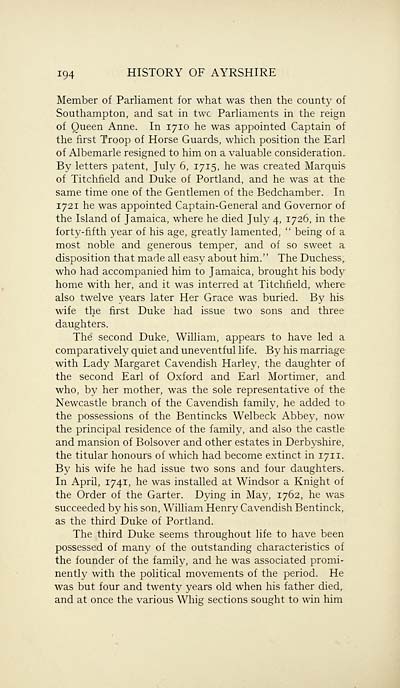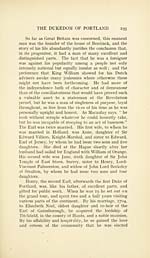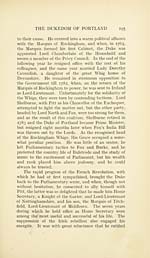Download files
Complete book:
Individual page:
Thumbnail gallery: Grid view | List view

194 HISTORY OF AYRSHIRE
Member of Parliament for what was then the county of
Southampton, and sat in two Parliaments in the reign
of Queen Anne. In 1710 he was appointed Captain of
the first Troop of Horse Guards, which position the Earl
of Albemarle resigned to him on a valuable consideration.
By letters patent, July 6, 1715, he was created Marquis
of Titchfield and Duke of Portland, and he was at the
same time one of the Gentlemen of the Bedchamber. In
172 1 he was appointed Captain-General and Governor of
the Island of Jamaica, where he died July 4, 1726, in the
forty-fifth year of his age, greatly lamented, " being of a
most noble and generous temper, and of so sweet a
disposition that made all easy about him." The Duchess,
who had accompanied him to Jamaica, brought his body
home with her, and it was interred at Titchfield, where
also twelve years later Her Grace was buried. By his
wife the first Duke had issue two sons and three
daughters.
The second Duke, William, appears to have led a
comparatively quiet and uneventful life. By his marriage
with Lady Margaret Cavendish Harley, the daughter of
the second Earl of Oxford and Earl Mortimer, and
who, by her mother, was the sole representative of the
Newcastle branch of the Cavendish family, he added to
the possessions of the Bentincks Welbeck Abbey, now
the principal residence of the family, and also the castle
and mansion of Bolsover and other estates in Derbyshire,
the titular honours of which had become extinct in 1711.
By his wife he had issue two sons and four daughters.
In April, 1741, he was installed at Windsor a Knight of
the Order of the Garter. Dying in May, 1762, he was
succeeded by his son, William Henry Cavendish Bentinck,
as the third Duke of Portland.
The third Duke seems throughout life to have been
possessed of many of the outstanding characteristics of
the founder of the family, and he was associated promi-
nently with the political movements of the period. He
was but four and twenty years old when his father died,
and at once the various Whig sections sought to win him
Member of Parliament for what was then the county of
Southampton, and sat in two Parliaments in the reign
of Queen Anne. In 1710 he was appointed Captain of
the first Troop of Horse Guards, which position the Earl
of Albemarle resigned to him on a valuable consideration.
By letters patent, July 6, 1715, he was created Marquis
of Titchfield and Duke of Portland, and he was at the
same time one of the Gentlemen of the Bedchamber. In
172 1 he was appointed Captain-General and Governor of
the Island of Jamaica, where he died July 4, 1726, in the
forty-fifth year of his age, greatly lamented, " being of a
most noble and generous temper, and of so sweet a
disposition that made all easy about him." The Duchess,
who had accompanied him to Jamaica, brought his body
home with her, and it was interred at Titchfield, where
also twelve years later Her Grace was buried. By his
wife the first Duke had issue two sons and three
daughters.
The second Duke, William, appears to have led a
comparatively quiet and uneventful life. By his marriage
with Lady Margaret Cavendish Harley, the daughter of
the second Earl of Oxford and Earl Mortimer, and
who, by her mother, was the sole representative of the
Newcastle branch of the Cavendish family, he added to
the possessions of the Bentincks Welbeck Abbey, now
the principal residence of the family, and also the castle
and mansion of Bolsover and other estates in Derbyshire,
the titular honours of which had become extinct in 1711.
By his wife he had issue two sons and four daughters.
In April, 1741, he was installed at Windsor a Knight of
the Order of the Garter. Dying in May, 1762, he was
succeeded by his son, William Henry Cavendish Bentinck,
as the third Duke of Portland.
The third Duke seems throughout life to have been
possessed of many of the outstanding characteristics of
the founder of the family, and he was associated promi-
nently with the political movements of the period. He
was but four and twenty years old when his father died,
and at once the various Whig sections sought to win him
Set display mode to:
![]() Universal Viewer |
Universal Viewer | ![]() Mirador |
Large image | Transcription
Mirador |
Large image | Transcription
Images and transcriptions on this page, including medium image downloads, may be used under the Creative Commons Attribution 4.0 International Licence unless otherwise stated. ![]()
| Histories of Scottish families > Ayrshire > Volume 2 > (204) Page 194 |
|---|
| Permanent URL | https://digital.nls.uk/95191546 |
|---|
| Attribution and copyright: |
|
|---|---|
| Description | A selection of almost 400 printed items relating to the history of Scottish families, mostly dating from the 19th and early 20th centuries. Includes memoirs, genealogies and clan histories, with a few produced by emigrant families. The earliest family history goes back to AD 916. |
|---|

